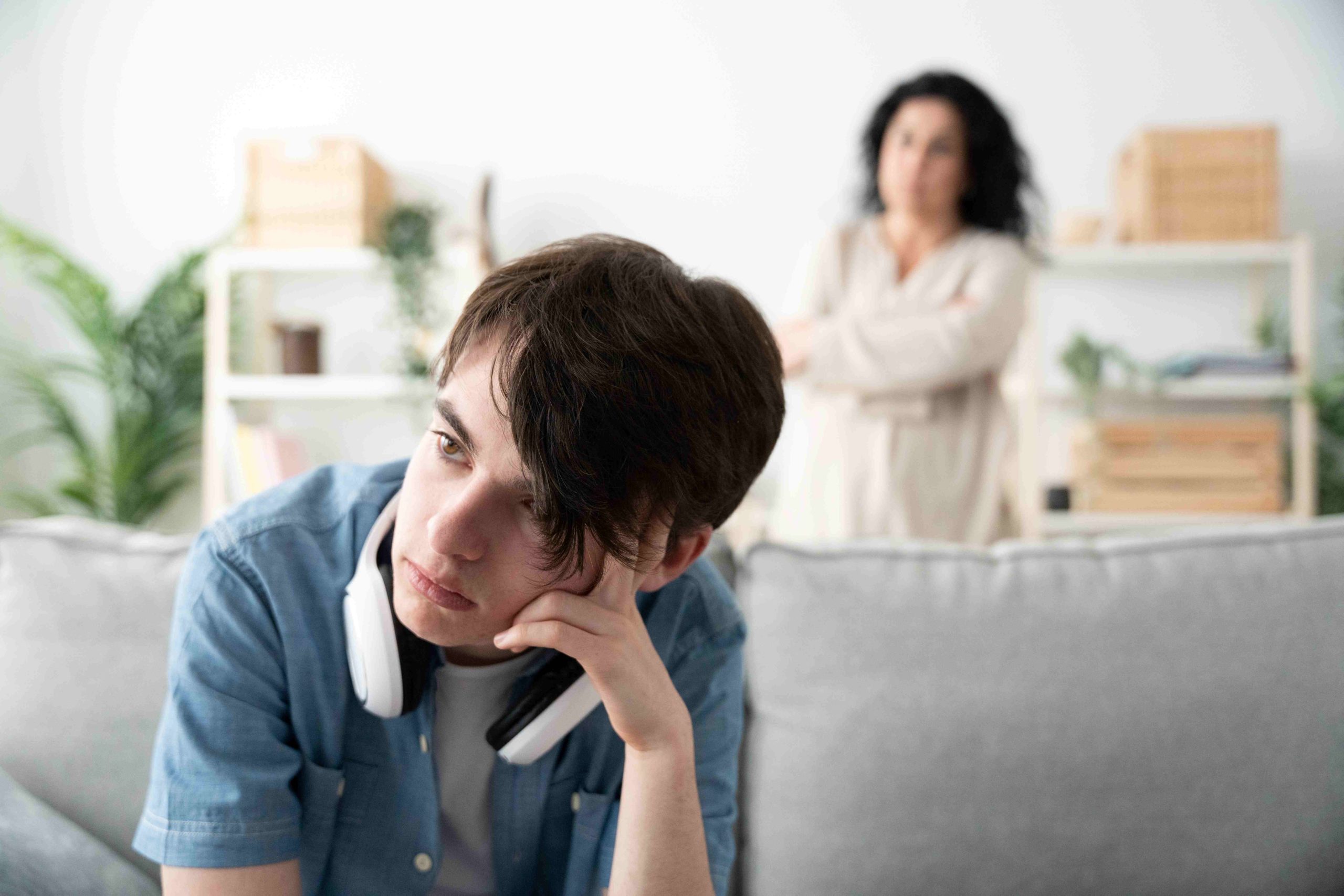Inside: 5 ways parents can become a safe space for their teen to share their emotions.

As parents of big kids, taking a trip down memory lane of our teenage years gives us some much-needed perspective as we parent teens of our own. It helps us remember all the feelings of displacement, confusion, and fear about who we were and how we fit into this great big world.
Recalling our deep longing for acceptance and belonging doesn’t take long. Nor does it take long to remember how impossible it felt to find either.
Many of us have strong memories about our desire for independence from our parents. We knew it all, remember?
The truth is, we didn’t know a lot. And deep down, we understood this. That’s what was so scary. But we wanted to know. So, we pretended we had the answers.
Teens often don’t understand what is going on with their bodies, minds, and emotions.
The teenage brain is incredibly complex and developing at a rapid clip. Most of being a teen feels entirely out of control: our bodies, emotions, desires, friend groups, and life.
But telling ourselves and others that we were fine on our own gave us some semblance of ‘control.’ Teens stop talking to their parents during this phase, and often connect more with their peers.
What we needed most in that season of our life was to be fully seen and fully heard for who we were at any given moment.
As is. Without judgment. To be celebrated. To just be accepted and loved for our authentic selves that spent most days cowering beneath the chaos and uncertainty we projected outside of us.
We needed counsel on regulating our emotions and making sense of all the thoughts swirling in our heads.
Providing this type of safe space is precisely what our teens need most from us today. Even more so with the added pressures and challenges of social media and 24/7 connection among other 21st century norms.
Brené Brown says, “We can’t be brave in the big world without at least one small safe space to work through our fears and falls.”
Round of applause, Brené. The world is even bigger and scarier for our kids than the much smaller circle of influence we were exposed to.
A safe space is a place or environment in which a person or category of people can feel confident that they will not be exposed to discrimination, criticism, harassment, or any other emotional or physical harm.
Our kids NEED us to be the one place they can count on for safety and serenity. A place of equanimity. They need us to be someone they can trust fully with the most vulnerable aspects of their evolving identity. Someone they can spend carefree timelessness with, free from the stressful mind movies they are constantly running as they try to survive and become.
5 Ways to Become a Safe Space for Your Teens
While there are many ways to be this type of respite for our tweens and teens, here are five specific ways we can assure our kid’s home is always a safe haven:
See and love who they are at the core without condition
Our teen’s abrasive behaviors, moodiness, and ever-changing emotions do not define them. None of us are our personality. We are not our mind, emotions, or our body. Our authentic selves exist beneath all these things. This is important to remember as we encounter the swings of emotion and sometimes wayward thinking by our teens. All that mess on the outside is just a projection of their inner world.
What they believe, stories they tell about themselves and others, conditioning, and unresolved trauma/pain they haven’t worked through. So, however our teen is acting in each moment is not an accurate reflection of the love they are made of. When we can see past this and layer down into the core of who they are, we communicate and help them believe they are good and worthy no matter what.
Be willing to listen without judgment
Our teens are particular about who they let into their hearts and minds. It’s a wonky mess in there and not a comforting thing to talk about their emotions and thought processes. So, if they choose to open up to us and share the real and raw, they need us to be a channel of peace to receive it. What they are processing won’t always sound pretty or kind or sensible. They can’t help it.
Until they can understand and handle their emotions and question their thoughts, we shouldn’t expect consistent, articulate, respectful, and balanced communication. It’s challenging not to take your teen’s behavior personally, but the reality is, our teen’s behavior isn’t about us. The less we personalize it, the better.
Don’t expect perfection
I don’t think we genuinely expect ‘perfection’ from our kids. If anything, we might be expecting perfection from ourselves and projecting our dissatisfaction with our flaws onto our kids (hi… just me speaking from experience).
But from their vantage point, every little thing we comment on, nitpick, or get frustrated over often comes across like we expect flawless behavior. The fastest way to curb this issue on both sides is to let go of our expectations and lists of shoulds. About everything. Like all of ’em. According to Anne Lamott, expectations are merely resentments under construction. This is a truth we can count on.
If you want to be a safe space for your teen, you have to let the small stuff go and pick and choose your battles.
Believe in them always
If we can’t believe in our kids, who will? We must instill this belief until they believe in themselves. Being a safe space for teens means never giving up on them.
We start by modeling it in our life, by believing in OURSELVES as parents. We can’t give away what we don’t have. When they see us pursue our passions confidently and continue to press forward when life knocks us on our ass, we create a safe space by default. Our kids need our loving voice in their ears, letting them know they have what it takes within. We teach them to trust their internal GPS and go through life with their heart wide open.
Look forward to learning and growing alongside them
Life is learning school for all of us. Being open to the idea that life happens ‘for us’ and not ‘to us’ is one of the greatest gifts we can give our kids. Being humble enough to admit our mistakes, offering ourselves grace as we grow, and being receptive to different perspectives are ways we show our kids that we recognize we are perfectly imperfect.
When they see us willing to change our beliefs or view life differently when new understanding comes our way, we model what it means to evolve and transform. This is the ultimate safe space for teens; being someone open-minded and willing to step into the unknown as we pursue the best version of ourselves. Ultimately, that’s what our teens do every day of their life to the best of their ability. What a privilege to walk alongside and join them.
Are you looking for more resources regarding how to talk with your teen? Check out our free ebook here: How to Talk to Your Teen – parentingteensandtweens.com which is full of resources and tips on how to connect with your big kid.
When you are in the thick of raising teens and tweens, we recommend Loving Hard When They’re Hard to Love by Whitney Fleming. In Loving Hard When They’re Hard to Love, blogger Whitney Fleming shares her favorite essays about raising three teenagers in today’s chaotic world. Written from the perspective of a fellow parent, each story will leave you with tears in your eyes and hope in your heart because someone else is saying exactly what’s been going through your mind.

*This post contains affiliate links where we may earn commissions for items purchased from links on our site.









How to talk to teen about consent sex ect when they just cover their ears and wont listen ?